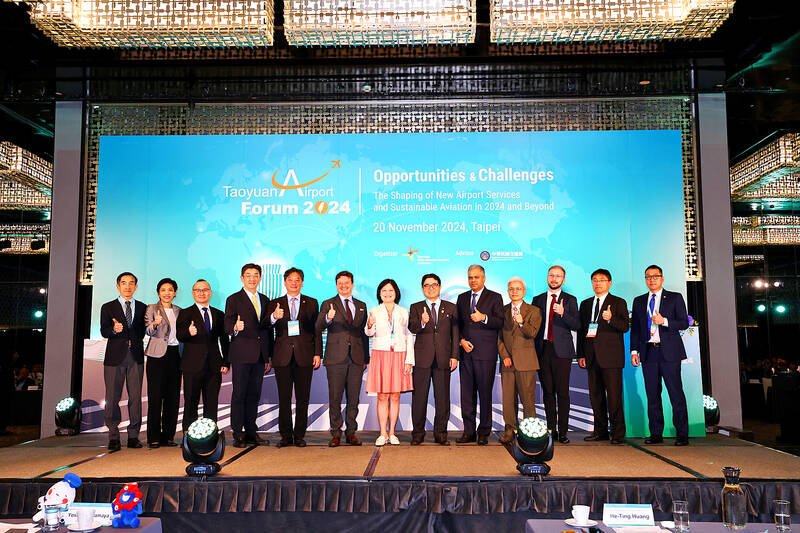At this year’s Taoyuan Airport Forum in Taipei yesterday, speakers focused on the airport’s continuing evolution, from improving the passenger experience to green energy goals.
Officials from Taoyuan International Airport Corp (TIAC), the Ministry of Transportation and Communications and international guests all highlighted the efforts made by the airport as it adapts to global trends.
TIAC has invested NT$5.2 billion (US$160 million) on 22 projects to improve efficiency and services, Ministry of Transportation and Communication (MOTC) Chief Secretary Huang He-ting (黃荷婷) said.

Photo courtesy of Taoyuan International Airport Corp
The airport, the gateway to Taiwan for most international travelers, is working to improve the passenger experience, with services remaining unaffected during the construction period, she added.
The airport is also improving conditions for its employees, Huang said, citing its recent decision to offer elderly care services for employees’ family members.
The airport has expanded its network of international partners to 240 and is ready to continue its positive sustainable development to connect Taiwan to the world, TIAC Vice President Lee Chun-te (李俊德) said.
Last year, Taoyuan airport joined more than 50 other airports from the region in pledging net zero carbon emissions by 2050, Airports Council International (ACI) Director General of Asia-Pacific and Middle East Stefano Baronci said.
Taoyuan airport is also part of ACI’s Airport Carbon Accreditation program, he added.
Baronci also highlighted emerging technology like artificial intelligence and “smart” infrastructure as areas of important future development that airports around the world are focused on.
“There is value in connectivity,” he said in response to a question about the airport’s future development, adding that there is potential for the airport to expand its personalized services to passengers as a way of enhancing travel experiences.
Kansai Airport CEO Yoshiyuki Yamaya spoke on his airport’s moves to lessen its environmental impact, such as solar panels, hydrogen-powered vehicles, and decreasing its water usage.
Taoyuan International Airport special report

POSITIVE DEVELOPMENT: Japan and the US are expected to hold in-depth discussions on Taiwan-related issues during the meeting next month, Japanese sources said The holding of a Japan-US leaders’ meeting ahead of US President Donald Trump’s visit to China is positive news for Taiwan, former Japan-Taiwan Exchange Association representative Hiroyasu Izumi said yesterday. After the Liberal Democratic Party’s landslide victory in Japan’s House of Representatives election, Japanese Prime Minister Sanae Takaichi is scheduled to visit the US next month, where she is to meet with Trump ahead of the US president’s planned visit to China from March 31 to April 2 for a meeting with Chinese President Xi Jinping (習近平). Japan and the US are expected to hold in-depth discussions on Taiwan-related issues during the

‘LIKE-MINDED PARTNER’: Tako van Popta said it would be inappropriate to delay signing the deal with Taiwan because of China, adding he would promote the issue Canadian senators have stressed Taiwan’s importance for international trade and expressed enthusiasm for ensuring the Taiwan-Canada trade cooperation framework agreement is implemented this year. Representative to Canada Harry Tseng (曾厚仁) in an interview with the Central News Agency (CNA) said he was increasingly uneasy about Ottawa’s delays in signing the agreement, especially as Ottawa has warmed toward Beijing. There are “no negotiations left. Not only [is it] initialed, we have three versions of the text ready: English, French and Mandarin,” Tseng said. “That tells you how close we are to the final signature.” Tseng said that he hoped Canadian Prime Minister Mark Carney

President William Lai (賴清德) yesterday bestowed one of Taiwan’s highest honors on Saint Vincent and the Grenadines (SVG) Ambassador Andrea Clare Bowman in recognition of her contributions to bilateral ties. “By conferring the Order of Brilliant Star with Grand Cordon on Ambassador Bowman today, I want to sincerely thank her, on behalf of the Taiwanese people, for her outstanding contribution to deepening diplomatic ties between Taiwan and SVG,” Lai said at a ceremony held at the Presidential Office in Taipei. He noted that Bowman became SVG’s first ambassador to Taiwan in 2019 and

A man walks past elementary school artworks at the Taipei Lantern Festival in Ximen District yesterday, the first day of the event. The festival is to run from 5pm to 10pm through March 15.